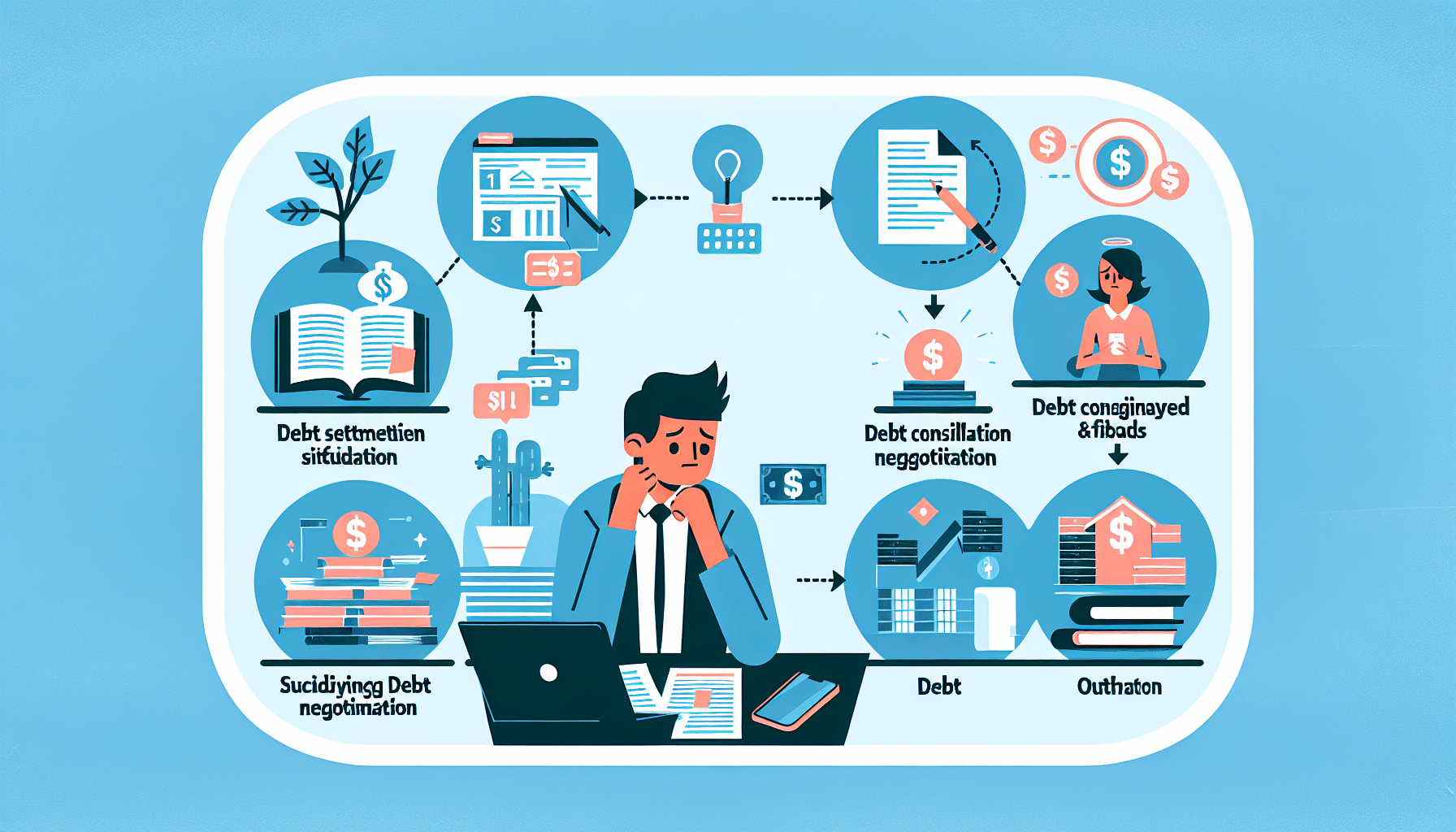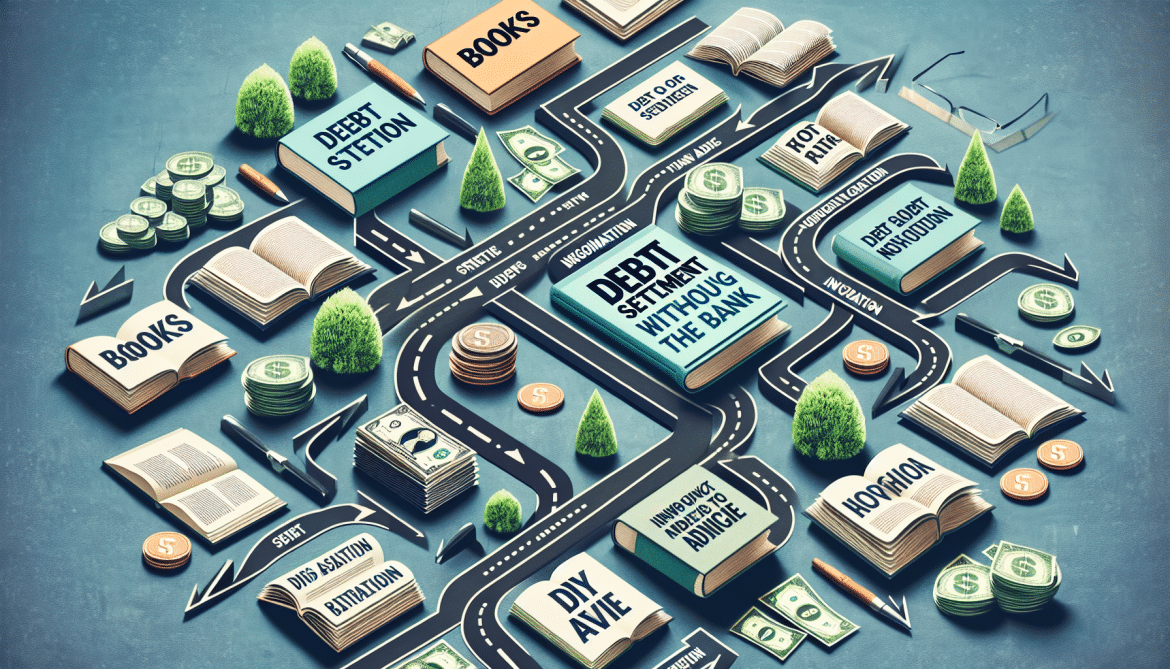In your search for the most affordable solution to tackle your debt, look no further! This article is here to guide you towards finding the best options for debt settlement. Being burdened with debt can feel overwhelming, but with the right approach, you can find relief and regain control of your financial future. By exploring various strategies and weighing their pros and cons, you'll be well-equipped to make the best decision for your unique situation. Let's dive in and find the most affordable solution that will pave the way towards a debt-free life!
Understanding Debt Settlement
What is debt settlement?
Debt settlement is a financial strategy that allows individuals to negotiate with their creditors to reduce the total amount of debt owed. It is an alternative to bankruptcy and can provide relief to individuals burdened by overwhelming debt.
How does debt settlement work?
Debt settlement involves contacting creditors and engaging in negotiations to reach an agreement on a reduced amount that will satisfy the debt. This lower amount can be paid in a lump sum or through installments. Debt settlement companies or individuals can handle the negotiation process on behalf of the debtor.
Benefits of debt settlement
One of the main benefits of debt settlement is the potential for a significant reduction in the total amount of debt owed. This can alleviate the financial strain and provide a fresh start for individuals struggling to meet their financial obligations. Debt settlement also offers a quicker resolution compared to other debt repayment options.
Drawbacks of debt settlement
While debt settlement can be an effective strategy, there are also some drawbacks to consider. For one, it may have a negative impact on your credit score and creditworthiness. Additionally, debt settlement requires careful financial planning and budgeting to ensure you can fulfill the negotiated settlement amount. Finally, debt settlement can also attract scams and fraudulent companies, so it's essential to be cautious and do thorough research.
Determining Affordability
Assessing financial situation
Before considering debt settlement, it's crucial to assess your overall financial situation. Take a close look at your income, expenses, and outstanding debts. This evaluation will help you understand your financial limitations and determine if debt settlement is a viable option for you.
Calculating debt-to-income ratio
To gauge your eligibility for debt settlement, calculating your debt-to-income ratio is essential. This ratio compares your total monthly debt payments to your monthly income. A high ratio indicates a heavy debt burden and may signal the need for debt settlement.
Evaluating available funds
In order to settle your debts, you must have available funds to make the negotiated payments. Take an honest look at your budget and savings to determine how much you can allocate towards debt settlement. This evaluation will help you assess your ability to fulfill the agreed-upon settlement amount.
Considering repayment options
When determining affordability, it's essential to consider all possible repayment options. Debt settlement is just one method, and alternatives such as debt management, consolidation, or seeking professional advice may be more suitable for your financial situation. Explore and weigh the pros and cons of each option before making a decision.

This image is property of images.unsplash.com.
Exploring DIY Debt Settlement
Researching debt settlement laws
If you are considering a DIY debt settlement approach, it's crucial to familiarize yourself with the laws governing debt settlement in your country or state. Understanding your rights and the legal boundaries will protect you from potential scams and ensure you navigate the process correctly.
Understanding negotiation tactics
Successful debt settlement requires effective negotiation tactics. Educate yourself on strategies that can help you achieve the best outcome. Techniques such as emphasizing your financial hardship, offering a lump sum payment, or proposing a favorable payment plan can increase the chances of obtaining a reasonable settlement.
Preparing settlement offers
As you start negotiating with your creditors, it's important to come prepared with settlement offers. Calculate and determine the amount you can offer and be ready to present your case to the creditors. Supporting documentation, such as proof of financial hardship, may strengthen your position during negotiations.
Communicating with creditors
Clear and respectful communication with your creditors is vital during the debt settlement process. Keep them informed about your intentions and maintain a proactive approach. Promptly respond to any inquiries or requests for information. By establishing open lines of communication, you can foster a more cooperative atmosphere, increasing the likelihood of successful negotiations.
Comparing Professional Debt Settlement Services
Benefits of professional services
Professional debt settlement services offer several benefits compared to the DIY approach. These companies have experience navigating the complexities of debt settlement and negotiating with creditors. They also have established relationships with many creditors, potentially increasing the chances of successful settlements.
Evaluating reputation and experience
When hiring a professional debt settlement service, it's crucial to thoroughly evaluate their reputation and experience. Look for reputable companies with a track record of successful settlements. Research customer reviews, ratings, and testimonials to ensure you choose a trusted and reliable service provider.
Understanding fee structures
Professional debt settlement services charge fees for their services, and it's important to understand their fee structures before making a commitment. Some companies charge a percentage of the total debt, while others may have upfront or monthly fees. Carefully review and compare costs to ensure they align with your financial situation and the expected benefits.
Reviewing success rates
Another factor to consider when comparing professional debt settlement services is their success rate. Look for companies that can demonstrate a high rate of successful settlements. This information will give you confidence in their ability to effectively negotiate with your creditors and provide the desired outcome.
This image is property of images.unsplash.com.
Utilizing Credit Counseling
Seeking advice from credit counselors
Credit counseling is a valuable resource for individuals seeking guidance and advice on managing their debts. These professionals can assess your financial situation, provide personalized advice, and offer strategies for debt repayment. Engaging with credit counselors can help you gain a better understanding of your options and make informed decisions.
Creating a budget and financial plan
A crucial aspect of credit counseling is the creation of a budget and a comprehensive financial plan. These tools will help you prioritize your expenses, allocate funds towards debt repayment, and establish healthy financial habits. A well-structured budget and financial plan can lay the foundation for successful debt management and settlement.
Exploring debt management options
Credit counselors can also help you explore various debt management options. They can negotiate with your creditors to lower interest rates, waive fees, or establish a payment plan that fits your budget. Debt management programs can be a valuable alternative to debt settlement, especially for individuals who prefer to repay their debts in full.
Weighing the pros and cons
When considering credit counseling as an option, it's important to weigh the pros and cons. Credit counseling can provide valuable guidance and support, but it may not provide the same level of debt reduction as debt settlement. Carefully evaluate your financial goals and priorities to determine if credit counseling aligns with your needs.
Investigating Debt Consolidation
Understanding debt consolidation
Debt consolidation is a financial strategy that combines multiple debts into a single loan or payment. By consolidating debts, individuals can simplify their repayment process and potentially secure a lower overall interest rate.
Consolidation methods and options
There are several debt consolidation methods and options available. Balance transfer credit cards, personal loans, and home equity loans are common solutions. Each method has its own eligibility criteria, terms, and potential benefits and drawbacks. Research and explore the different options to determine the most suitable consolidation method for your needs.
Evaluating interest rates and fees
When considering debt consolidation, it is crucial to carefully evaluate the interest rates and fees associated with the new loan or payment plan. Compare these rates to the ones you currently have on your existing debts. Lower interest rates and reasonable fees will contribute to a more affordable and efficient debt repayment process.
Determining eligibility
To pursue debt consolidation, individuals must meet certain eligibility criteria. Lenders will assess factors such as credit score, income stability, and existing debt to determine if you qualify for a consolidation loan or payment plan. Understanding your eligibility will help you determine if debt consolidation is a viable option for you.

This image is property of images.unsplash.com.
Considering Bankruptcy as a Last Resort
Understanding bankruptcy laws
Bankruptcy is a legal process that allows individuals or businesses to seek relief from overwhelming debts. It is considered a last resort option and should only be pursued after careful consideration and consultation with legal professionals. Familiarize yourself with bankruptcy laws in your country or state to understand the implications and requirements.
Identifying types of bankruptcy
There are different types of bankruptcy, and each has its own requirements and outcomes. Chapter 7 and Chapter 13 bankruptcy are the most common for individuals. Chapter 7 involves liquidating assets to pay off debts, while Chapter 13 involves creating a repayment plan based on income. Research and understand the implications of each type to make an informed decision.
Weighing the consequences
Bankruptcy has significant consequences that must be carefully considered. It can negatively impact your credit score, making it more challenging to secure loans or credit in the future. Bankruptcy may also require the sale of assets and can have long-term effects on your financial reputation. Evaluate the potential consequences and determine if bankruptcy is the most suitable option for your situation.
Consulting with a bankruptcy attorney
Given the complexity and legal implications of bankruptcy, it is essential to consult with a bankruptcy attorney. These professionals can guide you through the process, provide personalized advice, and ensure your rights are protected. A bankruptcy attorney will help you navigate the legal requirements and make informed decisions based on your unique circumstances.
Researching Alternative Settlement Options
Exploring debt management programs
Debt management programs are an alternative to debt settlement that can help individuals regain control of their finances. These programs involve working with a credit counseling agency to establish a repayment plan. While debt management programs may not provide the same level of debt reduction as settlement, they can offer a structured and manageable path to debt repayment.
Considering debt settlement companies
In addition to DIY debt settlement, there are also reputable debt settlement companies that individuals can consider. These companies specialize in negotiating with creditors and can handle the entire settlement process on your behalf. Research and compare different debt settlement companies to find one that aligns with your needs and financial goals.
Investigating debt negotiation
Debt negotiation involves directly contacting your creditors and requesting a reduction in the amount owed. This approach requires effective communication skills and negotiation tactics. By presenting your financial hardship and willingness to resolve the debt, you may be able to negotiate a favorable settlement directly with your creditors.
Looking into debt consolidation loans
Similar to debt consolidation, debt consolidation loans can help individuals simplify their repayment process by combining multiple debts into a single loan. With a debt consolidation loan, you can repay all your debts with one monthly payment. However, it's important to carefully evaluate the interest rates and terms of the loan to ensure it's an affordable and suitable option for your financial situation.

Avoiding Debt Settlement Scams
Recognizing red flags
Unfortunately, there are scam artists and fraudulent companies that prey on individuals seeking debt settlement. Recognizing red flags can help you avoid falling victim to these scams. Be wary of any company that guarantees specific outcomes or promises immediate debt relief. Legitimate debt settlement companies will be transparent about the risks and potential outcomes.
Researching companies and agencies
Thoroughly research any debt settlement company or credit counseling agency before engaging their services. Verify their credentials, check for any regulatory actions or complaints, and look for customer reviews and testimonials. A reputable company will have a positive track record and a history of satisfied clients.
Validating accreditations and certifications
Legitimate debt settlement companies and credit counseling agencies will have accreditations and certifications from reputable organizations. These credentials validate their professionalism and adherence to ethical standards. Look for accreditations from organizations such as the American Fair Credit Council (AFCC) or the National Foundation for Credit Counseling (NFCC) when evaluating service providers.
Checking consumer reviews and complaints
One of the most effective ways to assess the reputation of a debt settlement company or credit counseling agency is to check consumer reviews and complaints. Websites like the Better Business Bureau (BBB) or consumer review platforms can provide valuable insights from individuals who have previously engaged their services. Pay attention to recurring complaints or negative patterns that indicate potential problems.
Making an Informed Decision
Weighing the costs and benefits
When considering debt settlement or any other debt relief option, it's crucial to weigh the costs and benefits associated with each choice. Consider factors such as the impact on your credit score, the potential reduction in the total amount owed, and the long-term financial implications. Comparing the costs and benefits will empower you to make an informed decision that aligns with your goals and priorities.
Considering the impact on credit score
Debt settlement can have a negative impact on your credit score in the short term. Late payments, settled accounts, and other negative marks can appear on your credit report. However, if you are already struggling with significant debt and multiple delinquencies, the impact may be minimal compared to the financial relief it provides. Take into account your current credit score, financial goals, and the potential consequences before making a decision.
Seeking professional advice
Dealing with overwhelming debt and financial challenges can be overwhelming. Seeking professional advice from credit counselors, financial advisors, or bankruptcy attorneys can provide you with the guidance and support you need. These professionals can assess your unique situation, evaluate your options, and offer personalized advice based on their expertise.
Developing a plan for the future
Once you have chosen a debt settlement or debt relief option, it's essential to develop a plan for the future. Establishing healthy financial habits, creating a budget, and saving for emergencies will help you avoid falling into the same debts in the future. Stay committed to your plan and remain proactive in managing your finances to ensure long-term financial stability.



